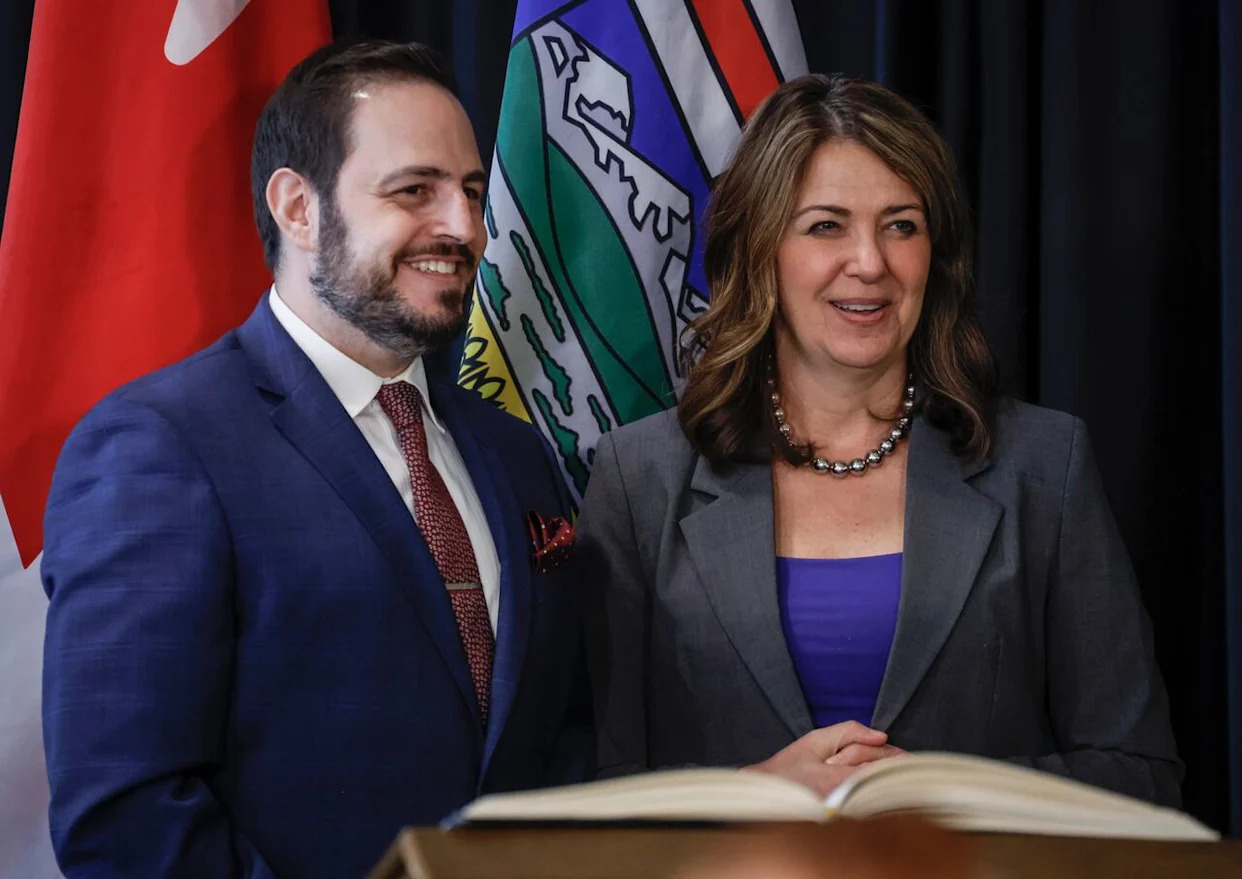Education
Alberta Premier Seeks Quick Teacher Certification Program

Alberta Premier Danielle Smith has directed her education ministers to develop a streamlined teacher training program aimed at individuals who already hold post-secondary qualifications. This initiative seeks to expedite the process for these candidates to enter the classroom, thereby addressing the province’s ongoing teacher shortage. Education and Childcare Minister Demetrios Nicolaides has been tasked with negotiating a new federal-provincial childcare agreement concurrently.
In her mandate letters, Smith instructed both Nicolaides and Advanced Education Minister Myles McDougall to create a certification program for individuals with expertise in “relevant fields,” which would allow them to teach without the necessity of a traditional education degree. Nicolaides emphasized the intent behind this initiative, stating, “The real goal here is to help get individuals that have some expertise in any industry… to qualify to teach and bring their wisdom, their experience and their knowledge into the classroom in a much faster manner.”
This proposed program diverges from Alberta’s current requirement that classroom teachers complete a four-year university education, which includes a teacher training preparation program. The existing “bridge-to-teacher” program has seen limited engagement, with only 113 individuals receiving provincial grants to participate in the last five years, according to Nicolaides’ press secretary, Garrett Koehler. The minister noted that the new abbreviated credential would restrict teachers to instructing in their specific areas of expertise.
Concerns have been raised regarding the implications of this expedited certification process. Jason Schilling, president of the Alberta Teachers’ Association (ATA), expressed apprehension that such changes could undermine the quality of the teaching profession. He highlighted the critical skills that teacher training encompasses, such as curriculum interpretation, student assessment, and classroom management. Schilling indicated that a shift in legal frameworks would be necessary to establish different categories of teacher certification and questioned how salaries and working conditions for these instructors would be addressed.
Adding to the discourse, Bradley Lafortune, executive director of Public Interest Alberta, cautioned that lowering the standards for teacher certification could jeopardize the quality of education in the province. He suggested that such a move might reflect a trend toward a more Americanized system of teaching, where educators typically earn lower wages. Lafortune described the proposed changes as a “slap in the face to the profession.”
Focus on Skilled Trades and Childcare
In addition to the teacher training initiative, Smith’s mandate reiterated previous goals aimed at enhancing the exposure of junior and senior high school students to skilled trades careers. Nicolaides is expected to devise a high-school apprenticeship system, promote trades careers to students, and invest in mobile career and technology studies (CTS) labs. He is also tasked with reviewing and improving support for K-12 students with complex needs, a demographic that has been increasing in Alberta schools.
As the province grapples with rising numbers of students requiring specialized support, Nicolaides acknowledged that he does not yet have a timeline for this review. There is also a desire to explore potential collaborations between his ministry and health and social services to better serve these students.
On the childcare front, Nicolaides is now the third minister since Smith assumed office in October 2022 to negotiate a federal-provincial agreement aimed at making childcare more affordable. The existing $3.8 billion agreement with the federal government aims to reduce childcare costs to $10 per day by 2026 and create 68,700 new licensed childcare spaces by March 2027. As of June, Alberta had added around 67% of these spaces, although progress has varied between for-profit and day home centres.
The current federal funding agreement is set to expire on April 1, 2026, and Alberta is one of two provinces that has not extended this agreement by an additional five years. Nicolaides stated that he has communicated with federal officials and is seeking a meeting with his counterpart to discuss necessary adjustments.
In her letter, Smith instructed Nicolaides to ensure that funding for new spaces does not discriminate between non-profit and for-profit childcare centres. Susan Cake, chair of Child Care Now Alberta, noted that Alberta’s mixed model of childcare is not unique among provinces and suggested that the government should focus on increasing funding to enhance affordability. Cake expressed disappointment at the lack of new childcare goals in Nicolaides’ mandate, advocating for prioritizing the creation of childcare spaces in underserved areas, training for early childhood educators, and comprehensive data collection on daycare demands throughout Alberta.
The developments in Alberta’s education and childcare sectors reflect ongoing efforts to address workforce challenges while balancing quality and accessibility for families across the province.
-

 Lifestyle4 weeks ago
Lifestyle4 weeks agoWinnipeg Celebrates Culinary Creativity During Le Burger Week 2025
-

 Health1 month ago
Health1 month agoMontreal’s Groupe Marcelle Leads Canadian Cosmetic Industry Growth
-

 Science1 month ago
Science1 month agoMicrosoft Confirms U.S. Law Overrules Canadian Data Sovereignty
-

 Education1 month ago
Education1 month agoRed River College Launches New Programs to Address Industry Needs
-

 Technology1 month ago
Technology1 month agoDragon Ball: Sparking! Zero Launching on Switch and Switch 2 This November
-

 Science1 month ago
Science1 month agoTech Innovator Amandipp Singh Transforms Hiring for Disabled
-

 Technology1 month ago
Technology1 month agoGoogle Pixel 10 Pro Fold Specs Unveiled Ahead of Launch
-

 Science1 month ago
Science1 month agoChina’s Wukong Spacesuit Sets New Standard for AI in Space
-

 Technology1 month ago
Technology1 month agoWorld of Warcraft Players Buzz Over 19-Quest Bee Challenge
-

 Science1 month ago
Science1 month agoXi Labs Innovates with New AI Operating System Set for 2025 Launch
-

 Business1 month ago
Business1 month agoNew Estimates Reveal ChatGPT-5 Energy Use Could Soar
-

 Technology1 month ago
Technology1 month agoFuture Entertainment Launches DDoD with Gameplay Trailer Showcase
-

 Business1 month ago
Business1 month agoDawson City Residents Rally Around Buy Canadian Movement
-

 Technology1 month ago
Technology1 month agoGlobal Launch of Ragnarok M: Classic Set for September 3, 2025
-

 Technology1 month ago
Technology1 month agoInnovative 140W GaN Travel Adapter Combines Power and Convenience
-

 Technology1 month ago
Technology1 month agoNew IDR01 Smart Ring Offers Advanced Sports Tracking for $169
-

 Science1 month ago
Science1 month agoNew Precision Approach to Treating Depression Tailors Care to Patients
-

 Technology1 month ago
Technology1 month agoHumanoid Robots Compete in Hilarious Debut Games in Beijing
-

 Health1 month ago
Health1 month agoGiant Boba and Unique Treats Take Center Stage at Ottawa’s Newest Bubble Tea Shop
-

 Technology1 month ago
Technology1 month agoArsanesia Unveils Smith’s Chronicles with Steam Page and Trailer
-

 Technology1 month ago
Technology1 month agoQuoted Tech Launches Back-to-School Discounts on PCs
-

 Education1 month ago
Education1 month agoAlberta Teachers’ Strike: Potential Impacts on Students and Families
-

 Technology1 month ago
Technology1 month agoDiscover the Relaxing Charm of Tiny Bookshop: A Cozy Gaming Escape
-

 Technology1 month ago
Technology1 month agoRaspberry Pi Unveils $40 Touchscreen for Innovative Projects










